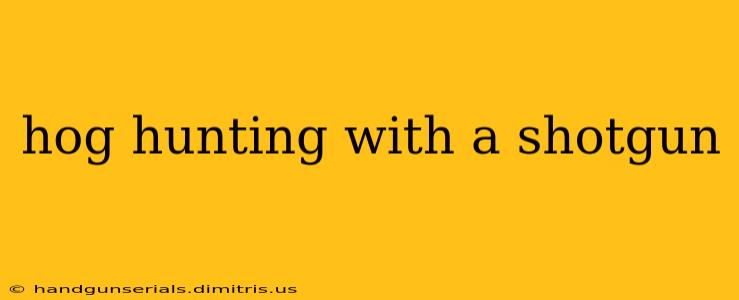Hog hunting with a shotgun presents a unique set of challenges and rewards. The versatility of the shotgun, coupled with the cunning nature of feral hogs, makes for an exciting and often demanding hunt. This guide delves into the effective techniques, smart tactics, and crucial safety measures for a successful and safe hog hunt using a shotgun.
Choosing the Right Shotgun for Hog Hunting
Selecting the appropriate shotgun is paramount. Several gauges and styles excel in this pursuit:
Gauge Selection:
- 12 Gauge: The most popular choice, offering a potent punch and wide selection of ammunition. Its power is effective at longer ranges, particularly with slugs.
- 20 Gauge: A lighter-recoiling option, ideal for smaller-framed hunters or those who prefer a less forceful shot. While effective at closer ranges, ammunition selection is key.
- .410 Bore: Generally less powerful than 12 or 20 gauge, best suited for very close-range shots. Its lighter recoil makes it a good option for beginners, but shot placement is critical.
Shotgun Type:
- Pump-Action: Reliable, durable, and relatively inexpensive, pump-action shotguns are a favorite among hog hunters for their dependability.
- Semi-Automatic: Offering faster follow-up shots, semi-autos are advantageous when multiple hogs are present. However, they are generally more expensive and require more maintenance.
- Over-and-Under: Though less common for hog hunting, over-and-unders provide a smooth shooting experience and the ability to switch between shot types quickly.
Ammunition Selection: Critical for Effective Hunting
Ammunition choice significantly impacts your success. Understanding the pros and cons of each type is crucial:
Buckshot:
- Best for: Close-to-medium range engagements (under 40 yards).
- Pros: Multiple projectiles increase the chance of a vital hit.
- Cons: Pattern spreads quickly, reducing effectiveness at longer ranges.
Slugs:
- Best for: Longer-range shots (up to 100 yards, depending on the slug type and your skill).
- Pros: High penetration power, ideal for taking down larger hogs.
- Cons: More expensive than buckshot, and recoil is more substantial.
Birdshot:
- Best for: Generally not recommended for hog hunting due to its limited stopping power and penetration.
Choosing the right ammunition is a balance between effective range and ethical killing power. Always aim for a vital shot to ensure a quick and humane kill.
Effective Hog Hunting Tactics with a Shotgun
Successful hog hunting involves more than just pulling the trigger. Strategic planning and execution are key:
Hunting Locations:
- Focus on areas with known hog activity: Look for signs such as rooting, wallows, trails, and droppings.
- Utilize feeders or bait: This can attract hogs to a specific location, making for easier hunting. Check local regulations regarding baiting.
- Night Hunting: Hogs are often more active at night, requiring the use of night vision or thermal optics.
Hunting Techniques:
- Still Hunting: Patiently waiting for hogs to approach. Requires camouflage and a good understanding of hog behavior.
- Spot and Stalk: Stealthily approaching hogs that you have spotted from a distance.
- Driving: Using multiple hunters to push hogs towards a designated shooting position. Communication is essential for safety.
Safety First: Essential Precautions When Hog Hunting
Safety should always be the top priority when handling firearms. Remember these crucial points:
- Always treat every firearm as if it were loaded.
- Keep the muzzle pointed in a safe direction at all times.
- Be certain of your target and what lies beyond it.
- Never climb a tree or cross a fence with a loaded shotgun.
- Wear appropriate safety gear: Eye protection and hearing protection are essential.
- Hunt with a partner whenever possible.
Hog hunting with a shotgun can be a thrilling and rewarding experience. By carefully considering these techniques, tactics, and safety precautions, you can significantly increase your chances of a successful and safe hunt. Remember to always adhere to local hunting regulations and practice responsible hunting ethics.

